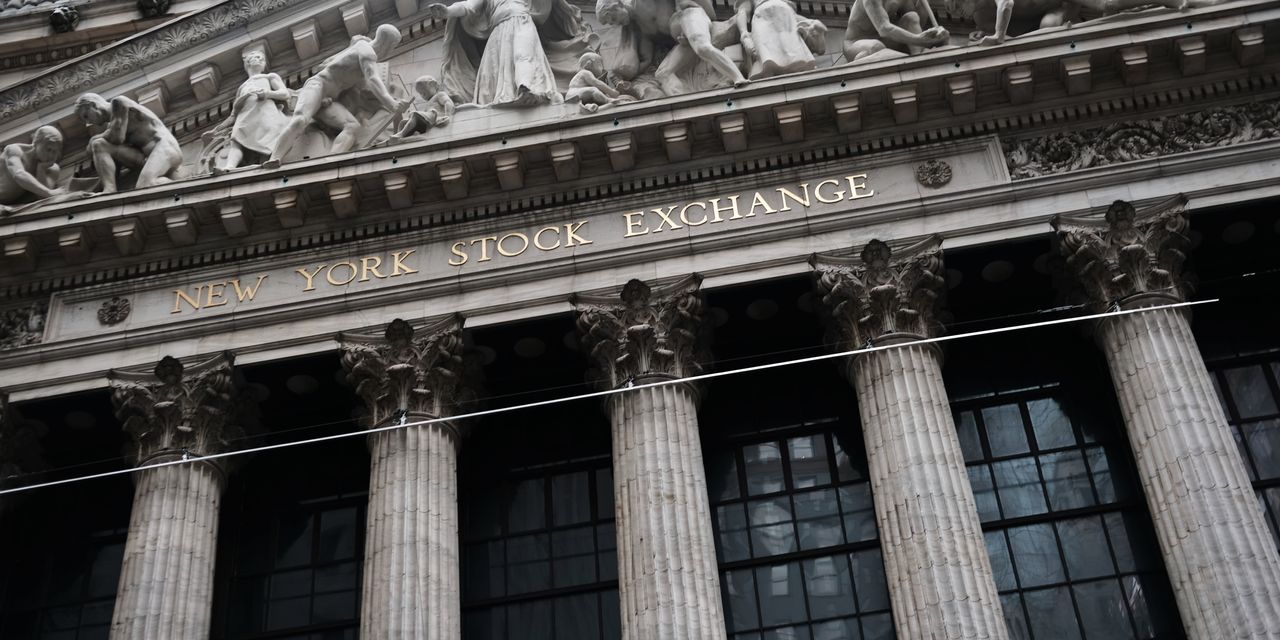U.S. stock indexes closed higher Wednesday, with the Dow breaking a three day losing streak, as bond yields eased after weaker-than-expected labor market data.
How stock indexes traded
-
The Dow Jones Industrial Average
DJIA
closed up 127.17 points or 0.39% today to 33,129.55 -
The S&P 500 index
SPX
finished up 34.30 points or 0.81% to 4,263.75 -
The Nasdaq Composite
COMP
gained 176.54 points or 1.35% to 13236.01
On Tuesday, the Dow industrials fell 431 points, or 1.29%, to 33,002, posting its biggest daily percentage drop since the March U.S. banking crisis and its lowest closing level since May 31, according to Dow Jones Market Data. The S&P 500 declined by 1.4%, to 4,229, while the Nasdaq dropped 1.9%.
What drove markets
Stocks ended higher Wednesday as Treasury yields retreated, after payroll processor ADP said U.S. private-sector employment rose by a tepid 89,000 in September. That was the smallest increase in two and a half years. Economists polled by the Wall Street Journal had forecast a gain of 150,000.
See: ADP says only 89,000 private jobs were created in September. That’s way below forecast.
Jeffrey J. Roach, chief economist at LPL Financial, said investors should treat the ADP report with caution as it does not include government workers and is not a “consistent indicator” of the official employment report that is set to publish on Friday morning.
“That said, momentum within the labor market is slowing across the board in both goods-producing and services-producing businesses,” Roach said in emailed commentary on Wednesday.
“The labor market is cooling and is taking pressure off the Fed concerned with the risk of a second wave of inflation. Businesses should get some respite as inflation decelerates and the labor market comes into balance,” he wrote.
However, the economic data the markets have received this week, including the job openings and Wednesday’s ADP report, show the pace of the labor-market softening is still “very slow” and is not leading any indication that interest rates will come down anytime soon, said Tim Urbanowicz, head of research and investment strategy at Innovator ETFs.
“Everybody keeps trying to look for hope in the labor market, but it becomes very, very slow in that pace in order to really be confident and get to a point where we could see the Fed cuts interest rates — we have to see more deterioration in the labor market,” Urbanowicz told MarketWatch via phone on Wednesday.
“Whether you see another [interest-rate] hike or not, you’re not seeing rates come down anytime soon,” he added.
Meanwhile, an Institute for Supply Management (ISM) barometer of business conditions at service-oriented companies such as retailers and health-care providers fell slightly in September to 53.6 from 54.5 in the previous month. A reading above 50 indicates growth in the services industry. The reading matched the forecast of economists polled by The Wall Street Journal.
“Overall the survey evidence remains consistent with moderate economic growth, suggesting that the apparent strength in the third quarter was an anomaly,” according to analysts at Capital Economics.
Weakness in U.S. stocks on Wednesday was led by the energy sector after crude oil prices fell to their lowest intraday level in four weeks. The S&P 500 Energy Sector
XX:SP500.10
was down 3.4%, marking its largest percentage decline since May 2, according to Dow Jones Market Data.
See: Rising Treasury yields are upsetting financial markets. Here’s why.
U.S. bond yields eased lower on Wednesday after hitting fresh 16-year highs in the previous session. The yield on the 2-year Treasury
BX:TMUBMUSD02Y
slipped by 10 basis points to 5.048%, while the yield on the 10-year Treasury
BX:TMUBMUSD10Y
also dropped 6.6 basis points to 4.735%.
The choppiness came after the S&P 500 shed 1.4% on Tuesday to close at its lowest level since the start of June as investors balked at the sight of benchmark borrowing costs hitting fresh 16-year highs in a reflection of concerns that a sturdy U.S. economy will cause the Federal Reserve to keep interest rates higher for longer.
Companies in focus
-
Apple Inc.
AAPL,
+0.73%
closed up 0.7% on Wednesday after KeyBanc’s Brandon Nispel cut his rating on the technology behemoth to sector weight, after being at overweight for at least two years. He said shares of the iPhone maker are trading near all-time high valuation and U.S. iPhone sales are likely to struggle. -
Moderna Inc.
MRNA,
+1.14%
finished up 1.1% after the company said its combination vaccine to protect against both COVID-19 and influenza generated a strong immune response compared to individual shots for the viruses in an early-stage study. -
Intel Corp.’s shares
INTC,
+0.67%
ended up 0.7% after the chip maker said it would follow up last year’s spinoff of Mobileye Global Inc.
MBLY,
+3.34%
with an IPO of its programmable solutions group in the next few years. -
Cal-Maine Foods Inc.
CALM,
-7.28%
tanked 7.3% after the egg producer reported quarterly results well below investors’ expectations and said the average price for a dozen eggs fell to $1.59 from $2.28 a year ago.
Read the full article here













Leave a Reply